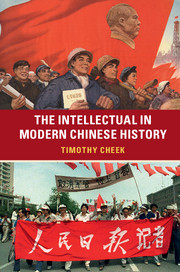Book contents
- Frontmatter
- Dedication
- Contents
- List of figures and maps
- Preface
- Acknowledgments
- List of abbreviations
- Map of China
- Introduction: for the public good
- 1 Reform: making China fit the world (1895–1915)
- 2 Revolution: awakening New China (1915–1935)
- 3 Rejuvenation: organizing China (1936–1956)
- 4 Revolutionary revival: overthrowing the lords of nation-building (1957–1976)
- 5 Reviving reform: correcting revolutionary errors (1976–1995)
- 6 Rejuvenation: securing the Chinese Dream (1996–2015)
- Conclusion: intellectuals, China, and the world
- Who's who (intellectuals featured in the main text)
- Further reading
- Bibliography
- Index
Conclusion: intellectuals, China, and the world
Published online by Cambridge University Press: 18 December 2015
- Frontmatter
- Dedication
- Contents
- List of figures and maps
- Preface
- Acknowledgments
- List of abbreviations
- Map of China
- Introduction: for the public good
- 1 Reform: making China fit the world (1895–1915)
- 2 Revolution: awakening New China (1915–1935)
- 3 Rejuvenation: organizing China (1936–1956)
- 4 Revolutionary revival: overthrowing the lords of nation-building (1957–1976)
- 5 Reviving reform: correcting revolutionary errors (1976–1995)
- 6 Rejuvenation: securing the Chinese Dream (1996–2015)
- Conclusion: intellectuals, China, and the world
- Who's who (intellectuals featured in the main text)
- Further reading
- Bibliography
- Index
Summary
The history of intellectuals in modern China offers a compelling vista of the efforts of intellectuals—thoughtful and dedicated, ambitious and conniving, cantankerous and cowed, deeply human—doing their best to serve the public good where they live. We have emphasized how different the world and its problems looked at different times, in different ideological moments. And we have tried to keep in mind the different social worlds in which intellectuals in China have operated, beginning with a simple trio (metropolitan, provincial, and local) and expanding by the end to six worlds of government service, academia, commerce, associational worlds, the waiyu world of foreign languages, and dissent. Throughout we have traced the persistence and variations of some key ideas in public life: the people, what it means to be Chinese, and democracy. In each ideological moment we have seen how these three core concepts of Chinese political life have endured but have come to incorporate significantly different meanings at different times. In the end, one has to be struck by the perseverance and dedication of China's thinkers and writers to use their skills, their social capital, and their life opportunities to serve China—serve China, of course, according to their own lights. The carnage of over a century has been horrific, the resilience impressive. Their contributions carry great promise for our shared future.
Intellectuals and China
The twentieth century has been the nationalist century in China's long history. No longer an empire, or tianxia, the identity, preservation, and perfection of this new version of “China”—Zhongguo, the nation-state in a Westphalian international order of nation-states—has dominated intellectual, as well as political, life across China's long twentieth century. Nationalism, in one form or another, has been the overriding concern of modern China's intellectuals.
That overriding concern, driven by the political realities of Western and then Japanese imperialism, as well as by domestic disorder, found expression differently in different ideological moments. We have seen “the question of the day” change. In 1905 it was how to save China. What kind of changes are needed to enable what is important in the world we grew up with to endure and prosper? In the 1920s the question of the day was how to awaken the Chinese people in order to save themselves from the clear and present danger of foreign domination and domestic misrule.
- Type
- Chapter
- Information
- The Intellectual in Modern Chinese History , pp. 320 - 331Publisher: Cambridge University PressPrint publication year: 2016



